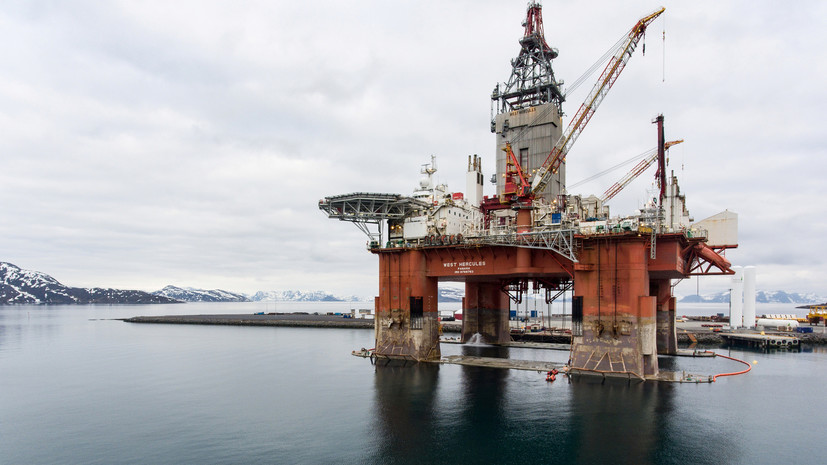Energy market analysts say that in 2020, the OPEC + agreement will be the determining factor in oil prices. Starting January 1, the countries participating in the transaction will begin to further reduce oil production. Thus, the fulfillment of the terms of the contract will have to restore the balance of supply and demand in order to keep prices from sharp fluctuations, experts say.
“It is expected that a reduction in production of more than 1.7 million barrels per day in the framework of the OPEC + transaction will be fully implemented, which will contribute to a decrease in global supplies of raw materials in 2020 and will help keep prices on average at $ 64 per barrel,” - Vadim Merkulov, director of the analytical department of Freedom Finance Investment Group, told RT.
The agreement is valid until the end of March 2020. Under the terms of the agreement, the OPEC member countries are obliged to reduce oil production by 1.172 million barrels per day, and the remaining parties to the transaction - by 531 thousand. Most of all, the production of raw materials should be reduced by Russia and Saudi Arabia - daily by 300 thousand and 482 thousand barrels, respectively.
However, there is another factor in the growth of quotes. According to analysts at Danish investment bank Saxo Bank, as the OPEC + transaction in the United States completes, shale oil production may slow down.
“OPEC, together with Russia, limits oil production. At the same time, American companies have less and less benefit in extracting shale oil, the production of which in the last ten years has extremely negatively affected prices. Therefore, the United States will no longer produce it in the previous volumes. As a result of this, we expect that the price of Brent crude oil may rise to $ 90 per barrel, ”said Stax Jacobsen, chief economist at Saxo Bank, in an interview with RT.
So far, experts believe such a sharp increase in quotes is unlikely. It is expected that some oil-producing countries can still significantly increase the production of raw materials and thereby curb rising prices.
“There are factors that can strengthen the supply of oil. For example, Ghana has discovered a new field and will now gradually increase production. If the US loosens sanctions against Iran or somehow resolves the political situation in Venezuela with its huge reserves of raw materials, then production volumes will increase further. All these events will undoubtedly have an impact on the world market, ”explained expert analyst at Finam Group Alexei Kalachev to RT.
According to him, the reason for the rise in oil prices could be a new round of tension in the Middle East. For example, in September 2019, a panic of investors caused an attack by drones at oil plants of the world's largest energy company - Saudi Saudi Aramco. As a result of air strikes, hydrocarbon production in the kingdom fell almost twice, and the cost of raw materials rose from $ 60 to $ 72 per barrel. Oil prices also rose significantly after the assassination of Iranian general Kassem Suleimani as a result of a US attack in Iraq.
In 2020, the attention of oil market players will be focused on the development of trade relations between the United States and China. In December 2019, US President Donald Trump announced the possible coordination of the first stage of the trade deal with China “within a couple of weeks.” The expected completion of the tariff confrontation between Beijing and Washington around the world could provoke an increase in demand for energy raw materials and lead to a rise in the price of oil.
“In December, the actual part of trade negotiations to conclude the first stage of the transaction was completed. Following the discussion, China expressed its readiness to reduce import duties on certain petrochemical products, which could stimulate the growth of oil consumption, ”Vadim Merkulov believes.
At the same time, experts have called the planned truce between China and the United States fragile. Previously, the parties have repeatedly tried to agree, after which they again exchanged new restrictions.
“The ceasefire cannot be called lasting, since Trump has spoken out about continued exposure to China. I think the trade war will continue and, most likely, in the field of high technology. It is possible that the States will take back their words about the deal - we see that this is one of Trump’s main tactics, ”said Alexei Maslov, head of the HSE School of Oriental Studies, RT.
According to analysts, a possible worsening of relations between China and the United States could cause a decrease in world oil prices. However, experts do not expect a sharp collapse of quotations.
“The trade war between the US and China is an important factor for the global economy, but the confrontation remains sluggish and very regulated. The parties either aggravate the relations or try to smooth them out again. The situation is more like a big game that no one wants to bring to a real conflict. Therefore, I believe that next year will be quite stable, and prices will continue to fluctuate in the range of $ 55-75 per barrel, ”concluded Alexey Kalachev.

